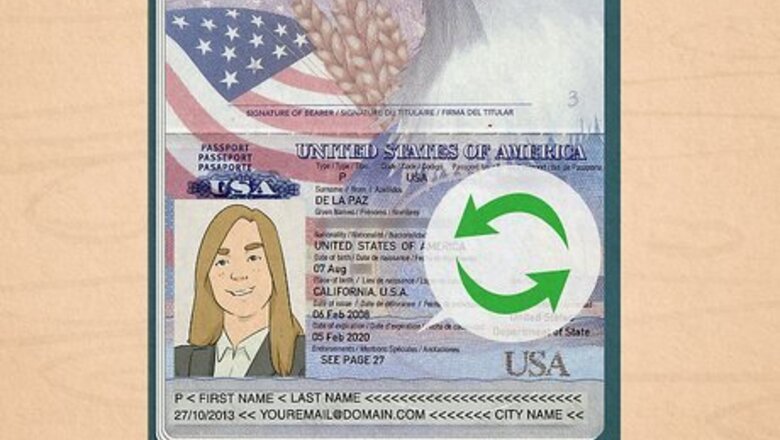
views
Getting Your Visa and Work Permit
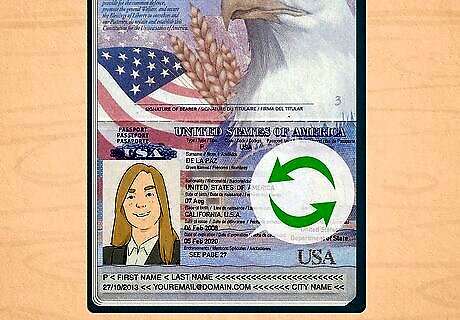
Renew your passport if it has fewer than 6 months' validity. Check the expiration date on your passport. China won't issue a visa if your passport won't be valid for at least 6 months from the date the visa would be issued. Since it can take a few months to get everything in place to move to China, it's a good idea to go ahead and get your passport renewed if it's going to expire in a year. That way, you won't have to worry about it after you move.
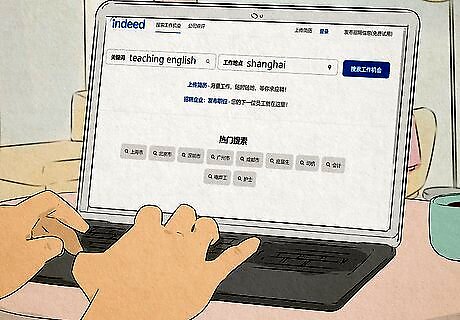
Find a job in China before you apply for a visa. China favors foreign workers who have a doctorate in their field and have achieved global acclaim. However, most expats living and working in China teach English. If you have at least a bachelor's degree and 2 years' experience teaching language, this might be the easiest job for you to get in China. With most companies, it doesn't matter what subject your bachelor's degree is in if English is your native language. However, each company has its own specific requirements. Open positions are typically advertised online and employers use online interviews so you can easily apply from your home country. If you're still in school, you might be able to find an internship in the Chinese office of an international company. Many of the language schools are international companies, so they might also have an office near you where you can attend an interview.

Work with your employer to get a foreigners' employment permit. You need an employment permit before you can apply for a visa to enter the country. Your employer will apply for this permit for you after they hire you. Once it's issued, they'll either send it to you or let you know that they have it. If your employer is submitting your visa application for you on your behalf, they might hold on to your work permit until after your visa is approved.

Get your photo taken for your visa application. Go to any passport photo location to get your photo taken for your visa. Make sure it's a clear color photo that depicts your entire head and face in front of a white background. You can use a digital or print image. Check the photo requirements brochure at http://www.china-embassy.org/eng/visas/zyxx/P020161206204655391310.jpg for additional requirements for your photos. Locations that routinely do passport photos are already set up to meet these requirements.

See a doctor for a physical examination. Before your appointment, download the form for your doctor to fill out from the Chinese embassy's website at http://www.china-embassy.org/eng/ywzn/lsyw/vpna/rap/t84254.htm. Take this form with you to your examination. China might not approve your visa application if you have HIV, TB, or evidence of drug use (past or present).
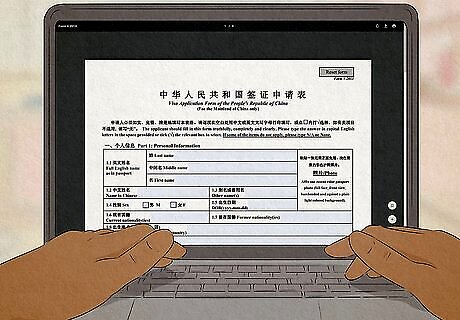
Complete the visa application. Download the form at http://www.china-embassy.org/chn/lszj/bgxz/P020130830121570742708.pdf. Provide your personal information as it appears on your passport, along with information about your employment, education, and family background. Check the information carefully to make sure everything is correct. China will deny your application if it contains any false, inaccurate, or incomplete information. Often, your employer will arrange for your visa for you—particularly if you're teaching English or working for a Chinese company. However, you'll still have to provide them with information and original documents to support that information, as well as sign the application.
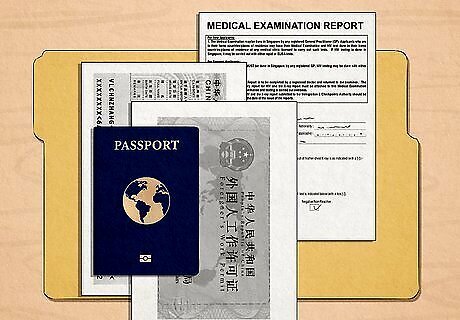
Assemble supporting documentation for the information on your application. Your application must be accompanied by original documentation—don't worry, you'll get everything back. If your employer is submitting your visa application on your behalf, you'll send these documents to them instead of to the consulate yourself with your application. Generally, you'll need the following: Your passport plus a photocopy of the data page and photo page (if they're separate pages) Photos for your visa Photocopies of any previous Chinese visas you've had Your foreigners' employment permit The physical examination form your doctor filled out

Submit your application to the Chinese consulate in your home country. Find the website for the Chinese embassy to get the contact information for the closest consulate to you. Then, you can either take your application in person or mail it to the address shown, along with your supporting documents. If you live in the US, you can find the nearest Chinese consulate at http://www.china-embassy.org/eng/zmzlljs/t84229.htm.

Pay the visa application fee when you pick up your visa. You only owe fees if your visa is approved. The embassy or consulate that processed your application will let you know when your documents are ready to pick up. The fee varies depending on your home country. For US citizens, the visa fee for a Z visa (employment in China) is $140 as of 2021. If your visa application is not approved, you don't have to pay the fee. You won't be given a reason for the denial and there's no way to appeal that decision. However, you can apply again if you believe the decision was made in error (or if you made a mistake on the application).
Moving to China

Find a place to live while you're in China. If you have a job with a Chinese company or you're teaching English, your employer will probably find an apartment for you—all you have to do is move in. If you're working for an international company, however, you might have to find a place on your own. You can still get help from people you work with, though. Focus on areas close to where you work. Especially if you're in a big city, such as Beijing, a long commute can be quite a strain. In larger cities, there are specific neighborhoods with a lot of expats. Although you might find it easier to fit in there, you won't be exposed to a lot of Chinese culture in those neighborhoods. Another downside of expat neighborhoods is that things tend to be more expensive. If you're looking for a place on your own, find a local to help you—and make sure you have plenty of cash on hand. Most landlords want 3-4 months rent upfront, especially in larger cities, such as Beijing. Generally, expect to spend between US $1500 and $2000 to move into an apartment.
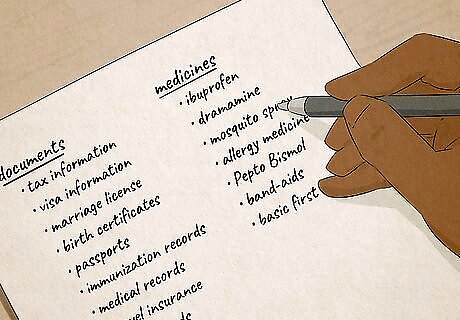
Create a list of items you plan to bring with you to China. Decide what you want to bring with you based on how long you're going to be in China. Your list will not only help you pack but also get through customs more easily when you arrive. You'll have to pay import duties (taxes) on many items, such as electronic and audio-visual equipment, even if you're only bringing them for personal use. If your work permit is valid for at least a year, you can bring a digital camera, personal computer, CD player, or other electronic devices duty-free for personal use. Check the list of prohibited items, available at http://english.customs.gov.cn/Statics/a5e61d7c-4818-44c0-96a1-911e060da95c.html. If there's anything on that list that you need, plan on buying it in China rather than bringing it with you from your home country.
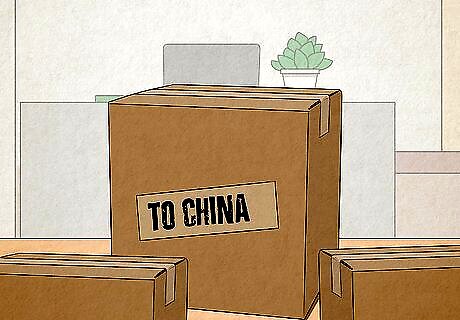
Pack your belongings and supplies to ship to China. Perhaps the easiest way to get your belongings to China, particularly if you plan to live there longer than a year, is to use an international shipping company. The company takes care of getting your items through customs so you don't have to worry about it. Then, you'll only have to deal with the items you brought with you on the plane. Pack plenty of toiletries and menstrual products—you'll have difficulty finding these in China. Bring toilet paper or tissue along as well, since these are also rare in China and public restrooms typically aren't stocked. Over-the-counter medicines can also be hard to find, so pack anything you use on a regular basis. If you wear larger sizes of clothing or shoes, make sure you pack enough of both—you'll have a hard time finding your sizes in China, especially outside expat neighborhoods in large cities.

Let your bank know that you're moving to China. Since you might not be able to open a Chinese bank account until you get there, make sure your credit and debit cards will all work in the country and you'll have access to your money. If your bank blocks your card, you might not be able to regain access without a call to customer service. Ask your employer how they'll be paying you and get direct deposit set up before you leave, if possible. You might have to wait to do that until you get a Chinese bank account.

Contact your phone company to unlock your phone. You need an unlocked phone before you can use a Chinese SIM card. Your phone company can usually help you do this (assuming your phone is completely paid for), or you can buy a new unlocked phone to use in China. Because of Chinese firewalls, you might not have access to some apps that you use on a regular basis in your home country. You can get around this by installing a VPN on your phone before you travel to China.
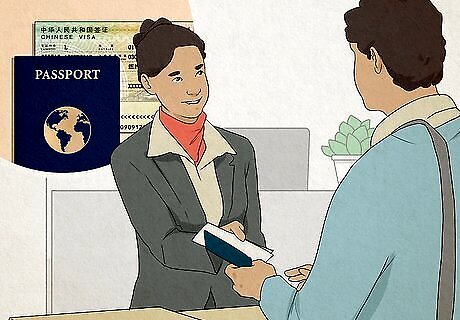
Travel to China with your passport and visa. Coordinate your travel plans with your employer so they'll know when to expect you and you can determine who's going to pay for your travel. Some employers may be willing to pay for your airfare to China, while others will require you to pay for this yourself. Keep your legal documents, including your passport, visa, work permit, and supporting documents, with you at all times—don't store them in checked baggage.
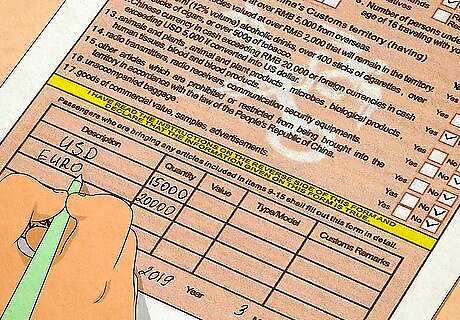
Declare personal belongings you've brought with you. When you arrive in China, fill out a customs declaration form listing the items you've brought with you. A customs officer reviews your list to determine if you owe any taxes for any of the items brought. They might also ask you questions about the things you've brought, especially if you've brought anything in significant quantities. Even if you have a work permit that's valid for a year or longer, you still have to pay customs duties on TV sets, video cameras or recorders, and other audio-visual equipment.
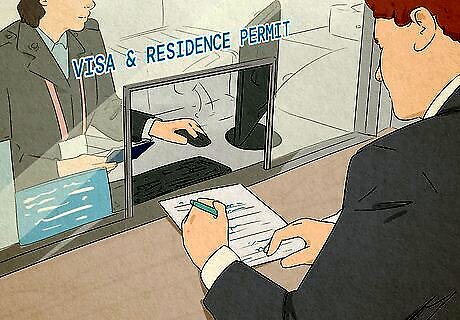
Register your accommodations with the local Public Security Bureau (PSB). All foreigners are required under Chinese law to register their accommodations within 24 hours. If your first stop is to a hotel or serviced apartment, the hotel or landlord will take care of your registration on your behalf. Otherwise, you need to do it yourself. If you're staying at a friend's house, use their information to register your accommodations. Every time you move to a different place, you need a new certificate of registration. So, for example, if you stay in a hotel for a week before moving into an apartment, you would need to register again when you moved to your apartment.
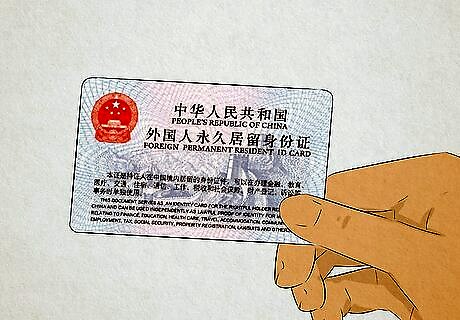
Apply for a residence permit within 30 days of your arrival. Once you've settled into your accommodations, go to the local PSB to apply for your residence permit. This is separate from registering your place of accommodation, although you can do it at the same time you register your long-term residence. Your residence permit will be valid for up to 5 years, depending on the length of your employment contract. If your contract is renewed, your residence permit can also be renewed. It typically takes around 2 weeks to process your application and issue your residence permit, although it might be available sooner. For example, if you're a foreign journalist, your residence permit will typically be issued within 5 days.
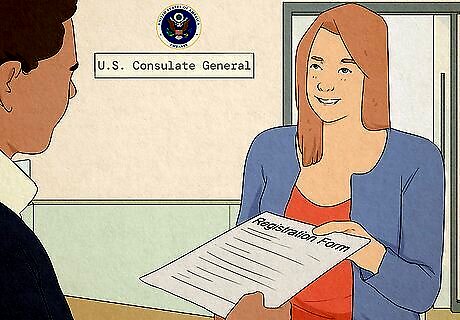
Register with the consular section of your home country's embassy. While this isn't required by law, registering with the consular section helps your home country's embassy better locate you in case of emergency. It can also be beneficial if you happen to lose your passport or run into any other issues while you're living in China. Contact your country's embassy in China before you travel to learn more about what you'll need to do once you arrive. You might need to make an appointment in advance.
Adapting to Life in China

Find suitable health insurance once you get to China. Many public hospitals in China don't accept medical insurance from abroad. To make sure your treatment is covered, you'll need a Chinese health insurance policy. Talk to your employer—they can help you with this. Find a nearby clinic you can use in case of an emergency and copy the address in English and Chinese. If they have a business card available in the lobby, take one of those and keep it with you so you can hand it to a taxi driver.

Learn how to use a squat toilet properly. Stand facing forward with your feet on either side of the toilet. If you're wearing long pants, it's a good idea to roll them up so you don't splash. Lower your pants about halfway down your thighs, then squat over the toilet. Stand slowly so you can maintain your balance, pulling up your pants as you stand. Carry your own toilet paper, since, as a rule, public toilets aren't typically stocked with it. Just don't flush it—throw it away in the nearest trash can.

Boil your tap water or use bottled water. As a rule, tap water in China is not safe to drink and can make you very sick. Fortunately, bottled water is relatively cheap. You can also buy water dispensers to filter water for drinking and cooking. Tap water is fine for showering or bathing, or even brushing your teeth—just don't swallow it.

Download WeChat to communicate with friends and colleagues. The texting app WeChat is central to life in China—people use it to chat, make plans, and even pay for things by scanning a merchant's QR code. Not only will you find that you need the app to communicate with people you already know, but also to make new friends and acquaintances. There are a number of expat groups on WeChat as well. Join a few so you can chat with other foreigners in the country and get some tips. You'll need a Chinese bank account to pay for things using WeChat. As long as you're planning on living in China for more than a few months, you can open a Chinese bank account as soon as you get into the country.

Order anything you need off of Taobao. Taobao is China's answer to Amazon in the US, offering everything from furniture to food. Delivery is usually pretty fast and prices are low. Most restaurants also offer delivery as well, which you can likely order online.
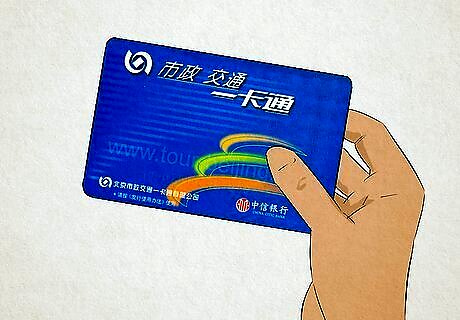
Buy a transportation card to get around by subway and bus. A transportation card is typically only a few bucks. Once you buy the card, you load it up with money to gain access to the local subway and bus systems, which will take you pretty much anywhere you need to go. Typically, you'll spend less than US $50 a month on transportation, particularly if you stick to public transportation rather than taking a taxi everywhere. Taxis are still relatively inexpensive but will run you about US $5 a trip. Download the Didi app on your phone as well. This Chinese app is similar to Uber or Lyft and can help you get a ride to wherever you need to go.
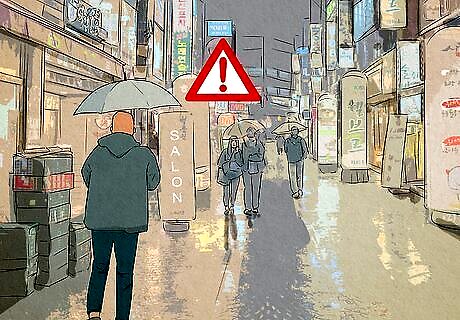
Take extra precautions in tourist areas. Violent crime is rare in China and the country, as a whole, is very safe. However, in tourist areas, foreigners who stand out can be targets for pickpockets. Just keep your legal documents and your phone secure on your person at all times and always be observant of your surroundings. If you're traveling alone, particularly at night, avoid poorly lit areas.

Pay for a private VPN for full internet access. A VPN allows you to access the internet as though your computer is located in another country. If you're bringing your own computer with you to China, a VPN enables you to access the full internet so you can chat with friends back home and use your old social media accounts. Set this up before you leave your home country—you won't be able to do it once you get to China. VPNs in China fall into a gray area and aren't out-and-out legal, but they're not illegal either. At the same time, the Chinese government doesn't look at them kindly, so use one at your own risk. There are free VPN services available, but they might not work as well in China or get you unlimited access to the internet. Look into 3 or 4 different services and compare their price, reliability, and features. If you know people who've lived in China, ask which VPN they used.
Immersing Yourself in Chinese Culture

Learn to speak some basic Mandarin. Even if you speak English at work, knowing a little Mandarin will help you get around more easily. While many people may know a little English, they might be shy or self-conscious about speaking it. In many areas, it can be difficult to find anyone who speaks English at all. Pay attention to the Chinese dialect spoken by most people locally—it might be very different from Mandarin. If you're planning on living there for a while, it's good to pick up some basic words and phrases in the local dialect in addition to Mandarin. If you don't have any experience with Asian or tonal languages, expect Chinese to be difficult. It's not a language that will be easy to pick up by immersion alone. Once you're in China, sign up for a Mandarin class.

Offer to pay the bill if you go out with friends. You might be accustomed to splitting the bill when you go out with friends in your home country, but in China, one person typically covers the whole party. Since you're a foreigner, people might assume that you have more money than they do and expect you to cover the tab. However, it's common for several Chinese people to argue over who's going to pay. Typically, the person who made the invitation is the first to claim the bill. It's still considered polite to offer to pay, though, and even argue with them over paying the bill. You don't have to worry about tipping servers—that's not a part of Chinese culture.

Respect elders and family. In Chinese culture, older people have a lot more seniority than younger people and are respected solely on that basis. Never interrupt an older person while they're talking or tell them that they're wrong—these things are considered highly disrespectful. If someone says they can't do something because their parents or grandparents wouldn't approve, just accept it and move on. It's considered crass to argue that they can do what they want.

Expect crowds and a lack of privacy and personal space. If you move to a large city, massive crowds are standard and people will commonly get very close to you. It's common for a shop assistant to follow you around as you shop (this is normal—they're not doing it because they think you're going to steal something). When waiting in line, people will crowd up close behind the next person. If you leave a lot of space, someone might jump in front of you because they assume you're not in line.

Embrace local customs and participate in your community. While it's possible in major cities to live and work in an expat area and interact with Chinese natives rarely, this is no way to enjoy your time in the country. Get to know your neighbors and talk to Chinese people to gain a better understanding of their culture and traditions. This is where knowing a little Mandarin (or the local dialect) will really open doors. People will be friendlier and more open to you if you make an effort to speak to them in their language. Ask people a lot of questions to better understand traditions and customs, rather than dismissing them because they're different from what you might be used to.

Don't expect discounts or special treatment because you're a foreigner. Some merchants might be eager to give you discounts because you're a foreigner (especially if you're from a Western country), but it's considered sleazy to ask for it or expect it. Treat everyone with politeness and respect and always be willing to accept the same "deal" as any Chinese person. In the same vein, be humble about your background. You may have privileges and advantages in your home country that don't exist in China, but constantly bragging about them is off-putting.

Maintain a neat and well-groomed appearance. In China, looking neat, clean, and well-groomed is more important than you might be used to. Worn-looking clothing, such as ripped jeans, that might have been trendy and fashionable in your home country is looked down upon in China. Make sure your clothing is always cleaned, ironed, and suitable for the occasion. If you're going out with friends, for example, you might wear dark pants and an ironed shirt, tucked in. Keep your fingernails trimmed and clean. It's usually considered better to be clean-shaven, but if you grow facial hair, make sure it's always well-groomed.


















Comments
0 comment